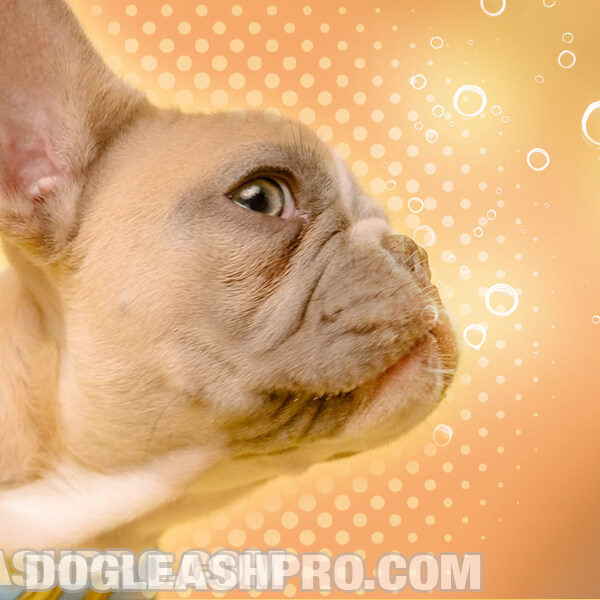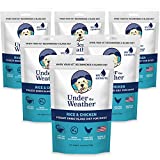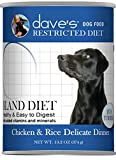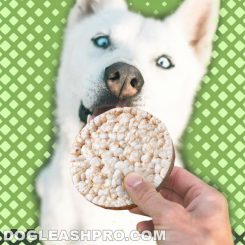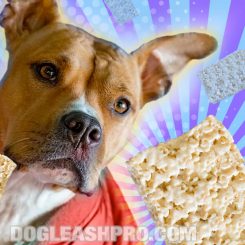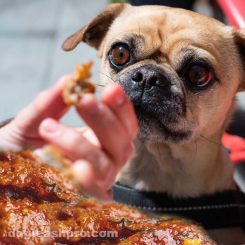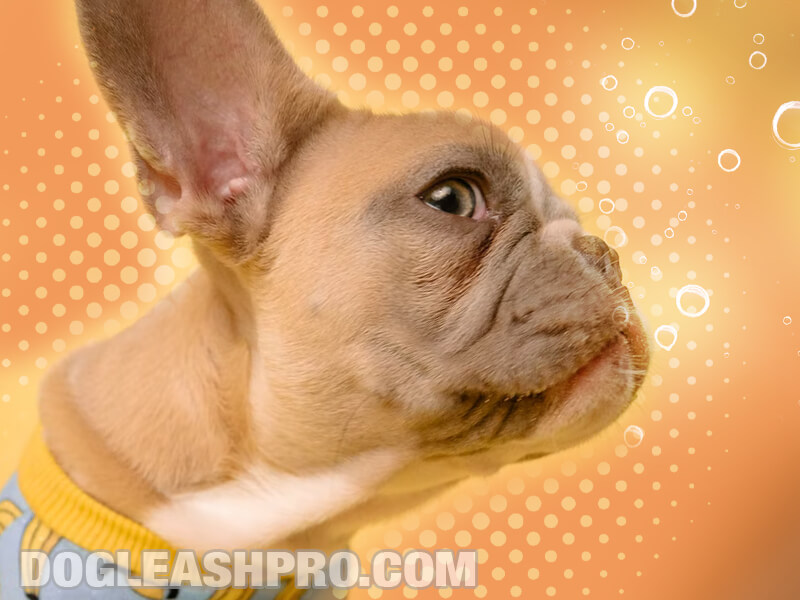
Why does my dog keep hiccuping and swallowing? Your dog keeps hiccuping and swallowing because she may have acid reflux or gastroesophageal reflux, which is the main cause of hiccuping, swallowing, gagging, and throat spasms in dogs. Fortunately, there are several solutions that can help reduce hiccuping in dogs, but before that, you’ll first want to find out the underlying causes of acid reflux.
Is your dog frantically gulping and licking her lips for more than an hour? Are you concerned that your dog keeps hiccuping and swallowing constantly every 15 to 30 seconds after their meal or in the evening?
Seeing our fur babies suffer from hiccups can be upsetting. While it may seem like there’s not much we can do to help when we see our precious pooch suffer from something they can’t control, the good news is that there is a solution to this issue and you no longer need to feel powerless.
Related Article: Can Dogs Get Brain Freeze?
Table of Contents
Why does my dog get hiccups? Underlying cause and symptoms

You’ve probably just fed your precious pup her dinner and now she is constantly licking and swallowing non-stop for more than a minute. Perhaps your dog is gulping and licking her lips just like this doggy here:
If the above video is exactly what your canine companion is going through, you’re not alone so don’t fret.
As a dog owner, I’ve also encountered this same situation with my charming 10-year old Chihuahua dog, Lily. After she eats her meal, she would continuously hiccup and lick her lips for more than a minute. Seeing her gag and swallow endlessly was both heart-wrenching and painful.

After speaking with my dog’s veterinarian, we came to find out that she was suffering from acid reflux (and your dog may too)!
If you find your dog sitting up and constantly gulping, licking her lips, swallowing like hiccups, heaving, and having throat spasms, then it is most likely due to her having esophageal irritation.
Especially after eating their meal, your four-legged friends may start to swallow and gulp frantically because they’re experiencing this burning acid coming up from their stomach and causing that irritating and painful burn in their throat.
The fluids and acids aren’t just coming up from the stomach, it can also come up from the intestines. When these acids keep regurgitating and flowing back up to your dog’s esophagus, it can be extremely painful, discomforting, and dangerous.
It is that pain, discomfort, and irritation that causes your dog to lick and swallow continuously for more than a minute or two. Your furry companion is swallowing and licking repeatedly because she is trying to push the stomach or intestine fluid and acid back down.
It can be dangerous because the spasm of acids can severely damage your dog’s esophageal lining which can also cause inflammation.
Following repeated hiccuping and swallowing, your dog may start to experience symptoms such as dizziness and nausea. You’ll know your K9 friend has nausea when she is constantly and relentlessly licking her lips.
If you suspect your dog has acid reflux, we highly recommend that you contact your dog’s vet right away. Acid reflux is a serious health issue and requires medical attention.
In fact, there are many factors that can cause acid reflux in dogs. They are:
- Hiatal hernia. A condition where the top of your dog’s stomach bulges up through an opening in his or her diaphragm.
- Your pooch may have a damaged or weakened esophageal sphincter. This can occur due to surgery or from birth.
- Liver or kidney disease or other metabolic diseases.
- Not tolerant of certain types of food.
- Allergic to certain food or have other allergies.
- Poor digestion.
- Your dog’s stomach wasn’t emptied properly.
- Canine obesity.
Dog hiccups symptoms
Here are some common signs and symptoms of acid reflux in dogs:
- Dog constantly licking and swallowing or,
- Dog constantly swallowing (or your dog excessively swallowing).
- Dog hiccups and licking lips.
- Your dog has the gulps (dog gulping air) or dog gulping and licking lips (you’ll hear her burping or gagging).
- Undigested food is regurgitated.
- Heaving and panting after eating their meal.
- Pacing around after eating their meal.
- Throwing up bile.
- Anorexia.
- Loss of appetite.
- Eating grass excessively.
- Depression.
Related Article: Why Do Dogs Eat Grass?
If you notice your dog having hiccups or your dog keeps swallowing like hiccups for more than a month or two, then he or she may have chronic acid reflux. This is serious and when it occurs over a few months, it can develop into a health condition called esophagitis or gastroesophageal reflux disease (GERD).
Again, it’s best to bring your dog to see the vet if you suspect your dog has esophagitis. While acid reflux is usually the cause of this health condition, there can be other factors that cause esophagitis and inflammation that you may not have been aware of.
These factors may include:
- Any infection your dog may have.
- Certain types of drugs may cause your dogs to keep getting hiccups.
- Your dog may have ingested caustic substances or chemicals. These chemicals are corrosive and can destroy or damage other substances they come into contact with.
- Foreign bodies.
- Anesthesia from previous or most recent medical procedures.
Your dog’s vet will be able to perform several tests on your furry friend to determine and confirm what is causing the gastroesophageal reflux disease (GERD) or esophagitis.
If this is the first time you’re noticing this hiccuping and swallowing behavior, then you may be concerned that there is something stuck in your canine friend’s throat.
To find out if this behavior is due to choking or acid reflux, you’ll want to see if your dog is coughing or drooling. If your pooch isn’t coughing or drooling, then the hiccup, licking of the lips, and swallowing is probably the result of gastroesophageal reflux disease (GERD) or esophagitis.
My dog has hiccups! What to do next?
We all agree that seeing our dogs hiccuping and swallowing constantly and repeatedly is without a doubt painful to watch. You may wonder the following question:
Why does my dog keep swallowing?
Fortunately, there are several solutions that can help resolve gastroesophageal reflux disease (GERD) and acid reflux in dogs. They are:
- Medication.
- Dietary changes.
- Surgical procedures.
- Home remedy.
Before you start treating your dog for acid reflux or gastroesophageal reflux disease (GERD), you’ll want to get a positive confirmation that your dog has this condition and not something like a stomach blockage or choking.
Here’s what you can do to check if your dog has any stomach or intestinal blockage:
- Check your dog’s gums. If the gum isn’t pink but rather purple, blue, or pale, then it could mean that there isn’t enough oxygen going to the vital organs or your dog could be suffering from blood loss.
- Bloody stools. The color of your dog’s poop can tell you a lot about his or her health. If your dog is suffering from blood loss, one way to confirm this is if they have bloody stools.
- Constipation.
- Dry heaving.
- Lethargy or change in behavior.
You may be interested in: White Specks in Dog Poop (Not Moving) – What Should You Do?
If your pooch isn’t experiencing any of the above symptoms of stomach blockage, then they may have acid reflux or GERD. If you’re unsure, we recommend that you consult your vet.
Once your vet confirms that your dog has acid reflux, then they may administer appropriate medications to help reduce or alleviate the acid reflux.
They may administer two medications. The first medication helps to reduce the acid and coat your dog’s stomach. The second medication is to coat your dog’s throat and promote healing.
Your vet may also prescribe antacids such as omeprazole (Prilosec) or famotidine (Pepcid-AC). Either of these antacids helps to neutralize the acid in the dog’s stomach and provide rapid relief from heartburn and acid reflux.
Most vets will recommend the Pepcid-AC because it acts fast to provide your dog with relief from acid reflux. Prilosec, on the other hand, seems to be much slower in providing that relief.
Here’s the dosage amount for both Pepcid-AC and Prilosec:
- Pepcid-AC (Famotidine): One (1) 10mg tablet per 20 pounds of body weight every 12 to 24 hours.
- Prilosec (Omeprazole): One dosage of 20mg every 24 hours.
Acid reflux can burn your dog’s throat and you can administer liquid sucralfate or Milk of Magnesia to help coat the throat ulcerations. Milk of Magnesia acts as an antacid that helps to relieve gastric reflux and protect the esophagus from stomach acids that may regurgitate.
Your dogs should take it orally and the dosage should be 1 to 2 teaspoons (5 to 10 mL) every 4 to 6 hours.
Natural ingredients like honey can also help. You can give your pooch some honey to soothe their throat in between doses. However, since honey is sweet and sugary, you’ll want to make sure not to feed your pooch too much of it. Too much sugar can cause dental issues like cavities as well as other health issues like diabetes and weight gain.
Related Article: Can Dogs Eat Brown Sugar?
Another food you can feed your canine friends if they’re constantly hiccuping and swallowing is plain bread. That’s because plain bread can absorb some of that burning stomach acid.
However, be mindful of how much bread you’re feeding your pooch because bread does contain lots of carbs and too much carb consumption is unhealthy for dogs.
Want more information? Check out this guide: Can Dogs Eat Pretzels?
The good news is that both antacids (Pepcid-AC and Prilosec) are safe for dogs to use and can be a long-term treatment option. Regardless, it’s a good idea to consult with your dog’s veterinarian and confirm that your furry friend can take either Pepcid-AC or Prilosec.
Another natural treatment option is to take your dog for a quick walk. Sometimes the repeated swallowing and hiccuping can be resolved by going for a quick walk around the neighborhood. This is a good option if your fur babies look normal and this occurs occasionally.
Going for a walk can help relax your dog’s esophageal muscles and keep her distracted from the hiccups.
Last but not least, you’ll want to make sure your pooch is healing and recovering quickly after the necessary treatment from acid reflux. To stay on the safe side, you’ll want to feed her a diet that is bland for at least a week. This will help keep the food down and avoid triggering acid reflux.
Instead of feeding your dog her normal meal, try a low-fat diet since it’ll produce very minimal stomach and intestinal acids and it’s easy to digest and stay down. You can feed her 3 times a day in small portions that include ⅔ white rice and ⅓ boiled chicken or beef. This is known as the chicken and white rice diet and it’s great for dogs with gastroesophageal reflux disease.
Want more information? Check out How to Get Your Dog to Eat When Sick for a list of bland food ideas.
Try this for at least one week and then slowly add your pup’s original food back in.
Dog keeps swallowing repeatedly: Bland diet is a solution
If you have a busy work schedule, you may not have the time or energy to prepare a bland diet meal for your canine friends. While your furry friend is recovering from acid reflux, you’ll want to make sure to keep his meal bland but filling.
When my Chihuahua was recovering from acid reflux, I decided to feed her the Under The Weather specially formulated bland dog food. To switch it up so she doesn’t get bored, I also feed her Dave’s Pet Food as well.
My Chihuahua loves both of these options and I know she enjoys it because she finishes the food even before I could check up on her.
It’s important to note that these two food options are only meant to be a temporary substitute to their regular meal while your dogs are recovering from acid reflux. These two food options are in no way a permanent solution and will not meet all of your dogs’ daily necessary nutrient requirements.
To satisfy your dog’s daily nutrient requirement, you can mix or add a little bit of their regular food to the meal. We recommend that you speak with your vet who can provide guidance on which certain food you can add or mix into their bland diet so that it meets your dog’s daily nutrient requirements without causing acid reflux.
As a dog owner myself who has given this to my two dogs, I like that the Under The Weather specially formulated bland dog food is made in the United States and it contains high-quality human grade ingredients that are also sourced in the U.S.
They use 100% cage-free white chicken meat or grass-fed bison meat. I really appreciate that there are no antibiotics or hormones used to raise any of the chickens or cows.
The Under The Weather specially formulated bland dog food is great for both adult dogs and puppies alike. Some of the positive aspects of this food include:
- Contains key electrolytes such as sodium and potassium which are crucial for proper muscle functions, energy levels, and keeping your dogs hydrated.
- Food is freeze-dried which means it retains its natural nutritional value and keeps the food fresh.
- Ingredients are high quality and human-grade.
- No artificial flavors.
- Gluten-free.
- Food is quick and easy to prepare – just add some water and it’s ready!
- Does not contain meat by-products.
- Free of chemicals and dye.
What I also love about this bland food comes in 6 different flavor options with white rice as the main ingredient. You can choose any one of the following for your pooch.
- Rice and Chicken.
- Rice, Chicken, and Pumpkin.
- Rice, Chicken, and Bone Broth.
- Rice, Hamburger, and Bone Broth.
- Rice, Hamburger, and Sweet Potato.
- Rice, Turkey, and Sweet Potato.
Fortunately for those who have a difficult time picking between the different flavor options, there is a bundle that you can purchase which contains all the available flavors.
What we like most about supporting this purchase is that the company supports saving the lives of shelter dogs. A portion of your sale will support transporting, rescuing, and neutering/spaying shelter dogs.
With a rating of 4.6 stars out of 5 stars on Amazon, we know this is a great option if your dog is suffering from acid reflux and needs a bland diet.
Another bland dog food option is Dave’s Pet Food. My Labrador will finish this when she’s recovering from acid reflux or gastroesophageal reflux.
Whether you have a young puppy or an adult dog, this bland dog food is a good choice since you can adjust the portions accordingly to meet his or her dietary needs.
Whether your canine companion is recovering from acid reflux, upset stomach, or has a sensitive stomach, Dave’s Pet Food is a perfect temporary solution. It comes in two delicious flavors: Lamb and rice, or Chicken and rice.
I feel content feeding this to my precious pooch because it is both wheat-free and gluten-free. Best of all, it is easy to digest.
What I like about this bland food option for my furry family member is that it contains various vitamins and minerals to meet your dog’s nutritional needs and keep him or her active. Dave’s Pet Food contains the following vitamins: A, B, C, and D. It also contains the following minerals:
- Potassium.
- Iron.
- Calcium.
- Sodium.
- Zinc.
With over 265+ unique ratings on Amazon and 4.7 out of 5 stars, it’s no wonder why many dog owners choose this delicious food for their furry friends.
DISCLAIMER: THIS WEBSITE DOES NOT PROVIDE MEDICAL ADVICE
The information, including but not limited to, text, graphics, images and other material contained on this website are for informational purposes only. No material on this site is intended to be a substitute for professional veterinary advice, diagnosis, or treatment. Always seek the advice of your veterinarian or other qualified health care provider with any questions you may have regarding a medical condition.
Resources:

With over five years of specialized experience as an animal writer, my expertise lies in dog nutrition, health, behavior, grooming, and training. I am dedicated to delivering helpful and informative content that caters to the well-being of our furry friends. My primary goal is to empower pet owners with knowledge and ensure our canine companions thrive in health and happiness. In my free time, I love volunteering at local dog rescue centers.
